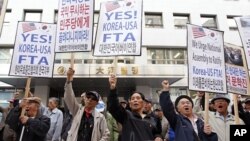The threat of physical fighting erupting among South Korean lawmakers is delaying approval of a crucial trade agreement with the United States.
For a second straight day, opposition politicians are blocking their colleagues in the governing party from entering a parliament conference room. That has prevented a committee from sending to the full National Assembly the South Korea-U.S. Free Trade Agreement.
If it makes it to the floor of the parliament it is guaranteed passage because the Grand National Party composes the majority and it favors the measure. But many lawmakers of the Democratic Party, who initially supported the pact four years ago, now oppose it. Among them: former Unification Minister Chung Dong-young.
Chung says he is not fighting for the party, but rather the fate of Korean citizens.
The only thing the two sides appear to agree on is that physical violence will erupt among lawmakers if the ruling party attempts to proceed with the ratification. Monday, the Democrats rejected a compromise with the GNP and began a physical blockade of the committee room. They want to remove a clause that would allow American investors to file lawsuits against Korean companies with an arbitration group.
A similar clause exists in current South Korean trade deals with the European Union, Chile and Singapore.
The U.S. Congress ratified the agreement on October 12. It was first negotiated in 2007 when previous administrations were in power in both Washington and Seoul.
Finance Minister Bahk Jae-wan says it is essential to approve the agreement because it will give a boost to South Korea's slowing economy.
Bahk says the government has already declared that it will readily provide a full package to support those in South Korea who will be damaged by the agreement. He says it is time for swift action and moving ahead with ratification.
After endorsement by legislatures in both Washington and Seoul the agreement is to take effect in 60 days. South Korea's failure to approve it by Monday means it will not be implemented on January first, as had been anticipated.





